Business Environment Article Review: Economic Concepts and Models
VerifiedAdded on 2023/06/08
|7
|1924
|52
Presentation
AI Summary
This presentation provides a comprehensive review of an article discussing the impact of rising shipping costs and Brexit on the shipping industry. The presentation delves into microeconomic concepts such as demand and supply, costs and production, to explain the challenges highlighted in the article. It examines how Brexit has affected the shipping industry, including currency arbitrage, export and import regulations, and the resulting congestion at ports. The presentation also analyzes the implications of these factors on various stakeholders, including consumers, hauliers, and shipping companies. Furthermore, it links the arguments to the theory of costs and production and discusses the impact of Brexit on the value added taxes and foreign direct investments. The presentation concludes by summarizing the key takeaways and providing a clear understanding of the economic concepts and theories discussed.
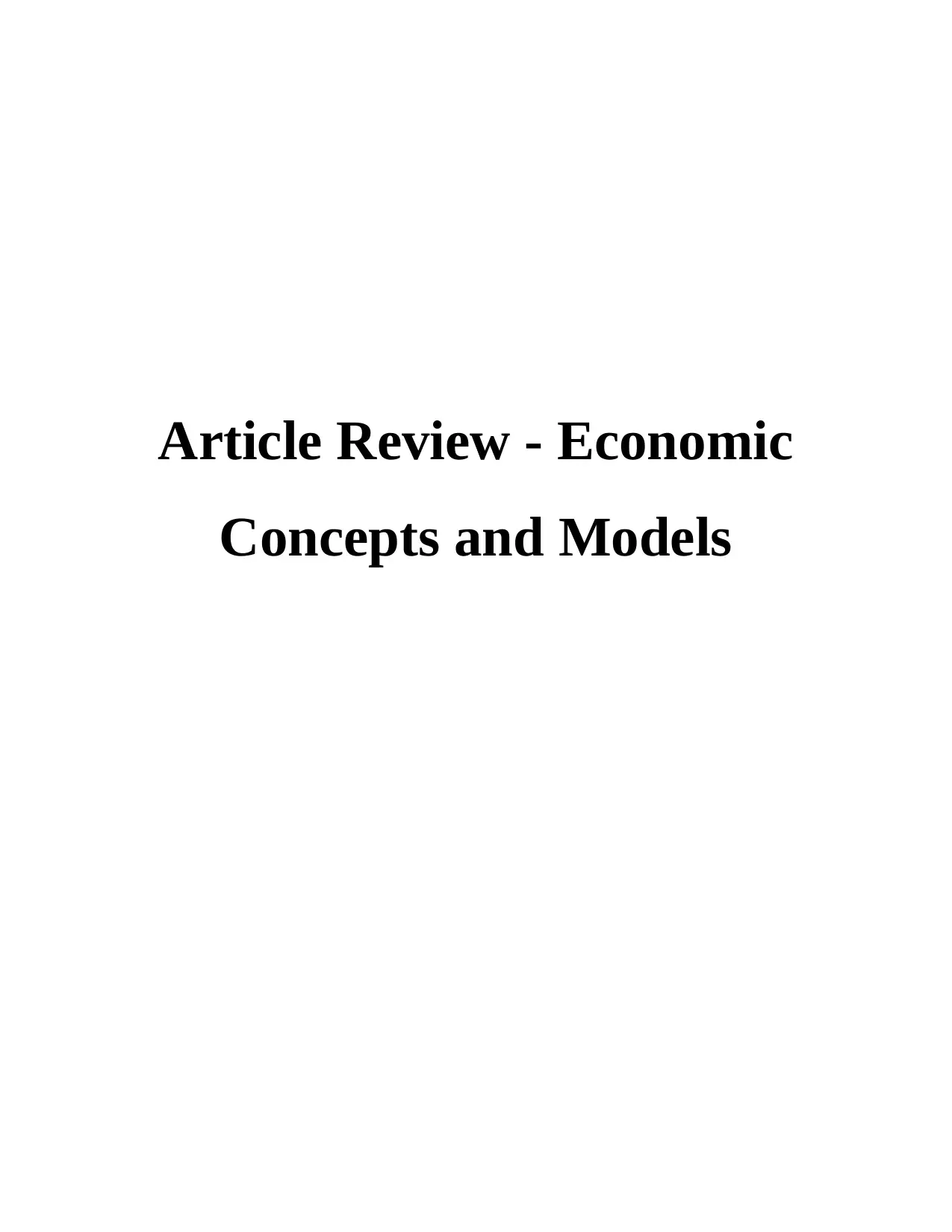
Article Review - Economic
Concepts and Models
Concepts and Models
Paraphrase This Document
Need a fresh take? Get an instant paraphrase of this document with our AI Paraphraser
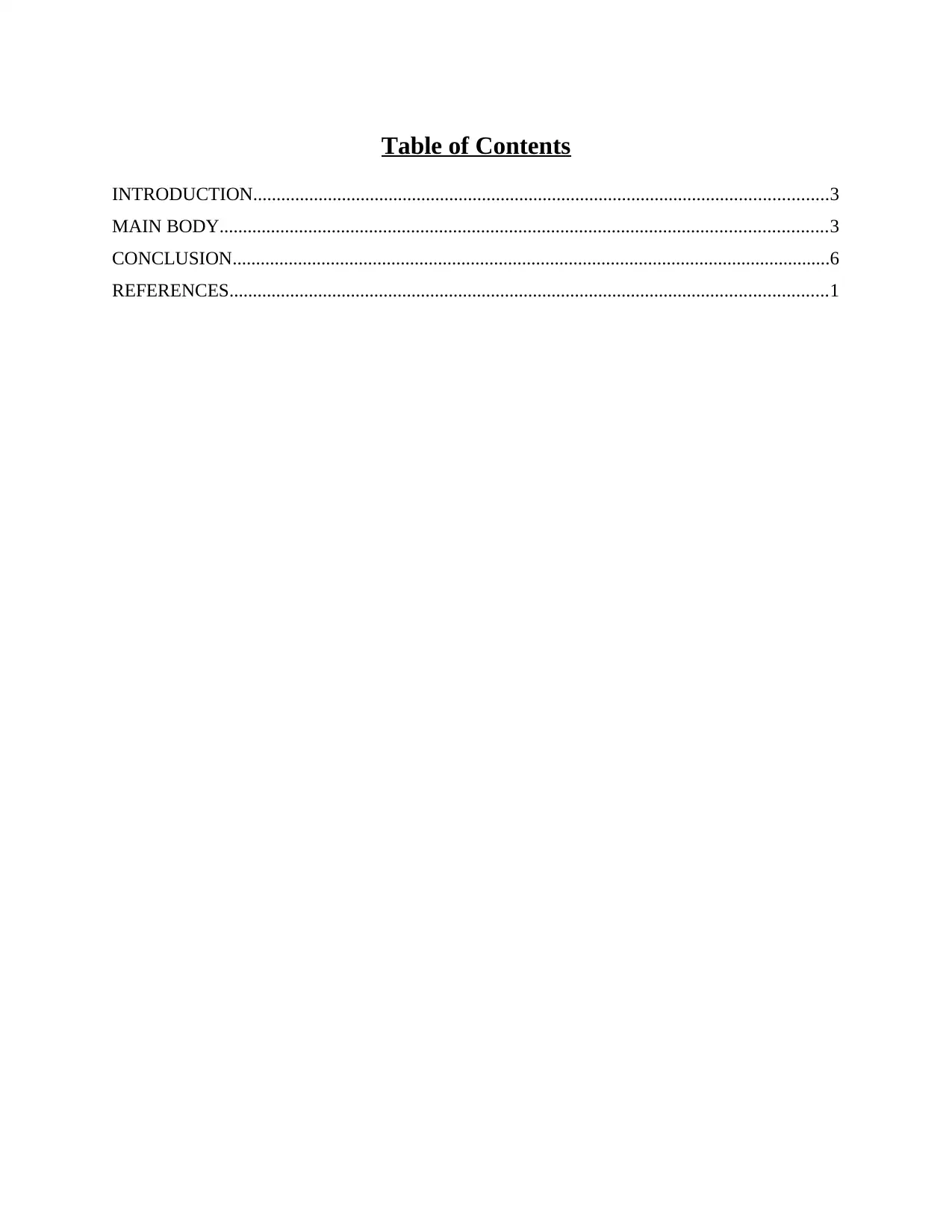
Table of Contents
INTRODUCTION...........................................................................................................................3
MAIN BODY..................................................................................................................................3
CONCLUSION................................................................................................................................6
REFERENCES................................................................................................................................1
INTRODUCTION...........................................................................................................................3
MAIN BODY..................................................................................................................................3
CONCLUSION................................................................................................................................6
REFERENCES................................................................................................................................1
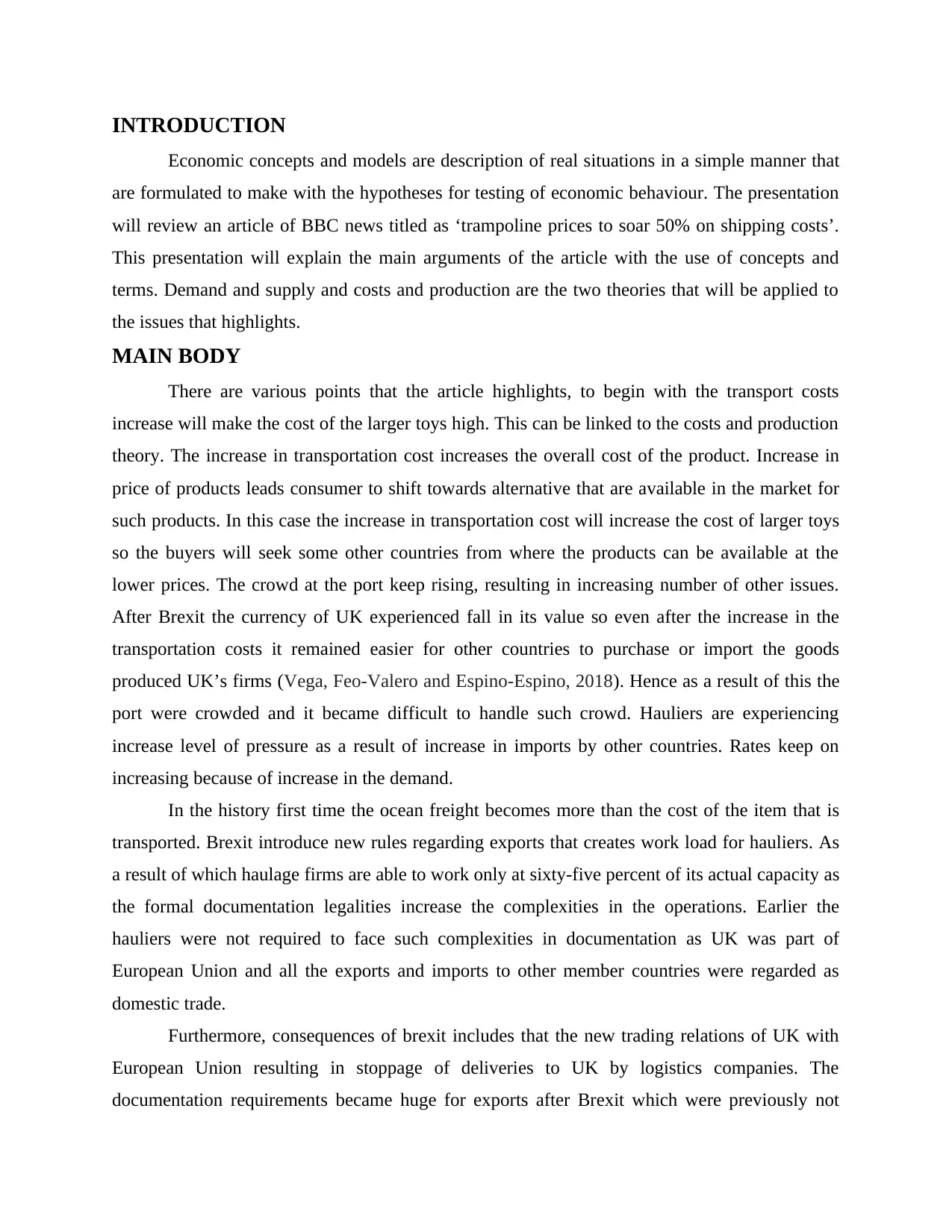
INTRODUCTION
Economic concepts and models are description of real situations in a simple manner that
are formulated to make with the hypotheses for testing of economic behaviour. The presentation
will review an article of BBC news titled as ‘trampoline prices to soar 50% on shipping costs’.
This presentation will explain the main arguments of the article with the use of concepts and
terms. Demand and supply and costs and production are the two theories that will be applied to
the issues that highlights.
MAIN BODY
There are various points that the article highlights, to begin with the transport costs
increase will make the cost of the larger toys high. This can be linked to the costs and production
theory. The increase in transportation cost increases the overall cost of the product. Increase in
price of products leads consumer to shift towards alternative that are available in the market for
such products. In this case the increase in transportation cost will increase the cost of larger toys
so the buyers will seek some other countries from where the products can be available at the
lower prices. The crowd at the port keep rising, resulting in increasing number of other issues.
After Brexit the currency of UK experienced fall in its value so even after the increase in the
transportation costs it remained easier for other countries to purchase or import the goods
produced UK’s firms (Vega, Feo-Valero and Espino-Espino, 2018). Hence as a result of this the
port were crowded and it became difficult to handle such crowd. Hauliers are experiencing
increase level of pressure as a result of increase in imports by other countries. Rates keep on
increasing because of increase in the demand.
In the history first time the ocean freight becomes more than the cost of the item that is
transported. Brexit introduce new rules regarding exports that creates work load for hauliers. As
a result of which haulage firms are able to work only at sixty-five percent of its actual capacity as
the formal documentation legalities increase the complexities in the operations. Earlier the
hauliers were not required to face such complexities in documentation as UK was part of
European Union and all the exports and imports to other member countries were regarded as
domestic trade.
Furthermore, consequences of brexit includes that the new trading relations of UK with
European Union resulting in stoppage of deliveries to UK by logistics companies. The
documentation requirements became huge for exports after Brexit which were previously not
Economic concepts and models are description of real situations in a simple manner that
are formulated to make with the hypotheses for testing of economic behaviour. The presentation
will review an article of BBC news titled as ‘trampoline prices to soar 50% on shipping costs’.
This presentation will explain the main arguments of the article with the use of concepts and
terms. Demand and supply and costs and production are the two theories that will be applied to
the issues that highlights.
MAIN BODY
There are various points that the article highlights, to begin with the transport costs
increase will make the cost of the larger toys high. This can be linked to the costs and production
theory. The increase in transportation cost increases the overall cost of the product. Increase in
price of products leads consumer to shift towards alternative that are available in the market for
such products. In this case the increase in transportation cost will increase the cost of larger toys
so the buyers will seek some other countries from where the products can be available at the
lower prices. The crowd at the port keep rising, resulting in increasing number of other issues.
After Brexit the currency of UK experienced fall in its value so even after the increase in the
transportation costs it remained easier for other countries to purchase or import the goods
produced UK’s firms (Vega, Feo-Valero and Espino-Espino, 2018). Hence as a result of this the
port were crowded and it became difficult to handle such crowd. Hauliers are experiencing
increase level of pressure as a result of increase in imports by other countries. Rates keep on
increasing because of increase in the demand.
In the history first time the ocean freight becomes more than the cost of the item that is
transported. Brexit introduce new rules regarding exports that creates work load for hauliers. As
a result of which haulage firms are able to work only at sixty-five percent of its actual capacity as
the formal documentation legalities increase the complexities in the operations. Earlier the
hauliers were not required to face such complexities in documentation as UK was part of
European Union and all the exports and imports to other member countries were regarded as
domestic trade.
Furthermore, consequences of brexit includes that the new trading relations of UK with
European Union resulting in stoppage of deliveries to UK by logistics companies. The
documentation requirements became huge for exports after Brexit which were previously not
⊘ This is a preview!⊘
Do you want full access?
Subscribe today to unlock all pages.

Trusted by 1+ million students worldwide
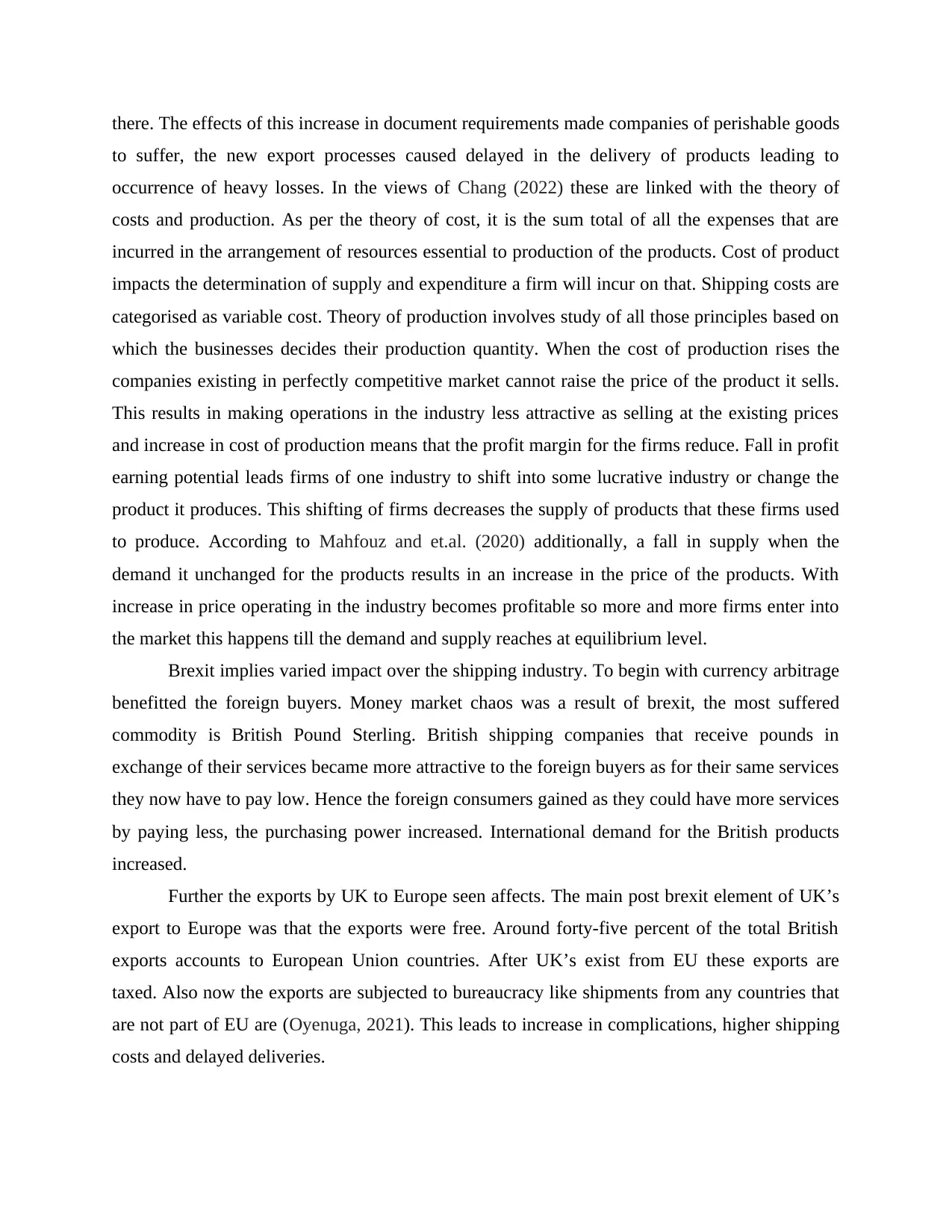
there. The effects of this increase in document requirements made companies of perishable goods
to suffer, the new export processes caused delayed in the delivery of products leading to
occurrence of heavy losses. In the views of Chang (2022) these are linked with the theory of
costs and production. As per the theory of cost, it is the sum total of all the expenses that are
incurred in the arrangement of resources essential to production of the products. Cost of product
impacts the determination of supply and expenditure a firm will incur on that. Shipping costs are
categorised as variable cost. Theory of production involves study of all those principles based on
which the businesses decides their production quantity. When the cost of production rises the
companies existing in perfectly competitive market cannot raise the price of the product it sells.
This results in making operations in the industry less attractive as selling at the existing prices
and increase in cost of production means that the profit margin for the firms reduce. Fall in profit
earning potential leads firms of one industry to shift into some lucrative industry or change the
product it produces. This shifting of firms decreases the supply of products that these firms used
to produce. According to Mahfouz and et.al. (2020) additionally, a fall in supply when the
demand it unchanged for the products results in an increase in the price of the products. With
increase in price operating in the industry becomes profitable so more and more firms enter into
the market this happens till the demand and supply reaches at equilibrium level.
Brexit implies varied impact over the shipping industry. To begin with currency arbitrage
benefitted the foreign buyers. Money market chaos was a result of brexit, the most suffered
commodity is British Pound Sterling. British shipping companies that receive pounds in
exchange of their services became more attractive to the foreign buyers as for their same services
they now have to pay low. Hence the foreign consumers gained as they could have more services
by paying less, the purchasing power increased. International demand for the British products
increased.
Further the exports by UK to Europe seen affects. The main post brexit element of UK’s
export to Europe was that the exports were free. Around forty-five percent of the total British
exports accounts to European Union countries. After UK’s exist from EU these exports are
taxed. Also now the exports are subjected to bureaucracy like shipments from any countries that
are not part of EU are (Oyenuga, 2021). This leads to increase in complications, higher shipping
costs and delayed deliveries.
to suffer, the new export processes caused delayed in the delivery of products leading to
occurrence of heavy losses. In the views of Chang (2022) these are linked with the theory of
costs and production. As per the theory of cost, it is the sum total of all the expenses that are
incurred in the arrangement of resources essential to production of the products. Cost of product
impacts the determination of supply and expenditure a firm will incur on that. Shipping costs are
categorised as variable cost. Theory of production involves study of all those principles based on
which the businesses decides their production quantity. When the cost of production rises the
companies existing in perfectly competitive market cannot raise the price of the product it sells.
This results in making operations in the industry less attractive as selling at the existing prices
and increase in cost of production means that the profit margin for the firms reduce. Fall in profit
earning potential leads firms of one industry to shift into some lucrative industry or change the
product it produces. This shifting of firms decreases the supply of products that these firms used
to produce. According to Mahfouz and et.al. (2020) additionally, a fall in supply when the
demand it unchanged for the products results in an increase in the price of the products. With
increase in price operating in the industry becomes profitable so more and more firms enter into
the market this happens till the demand and supply reaches at equilibrium level.
Brexit implies varied impact over the shipping industry. To begin with currency arbitrage
benefitted the foreign buyers. Money market chaos was a result of brexit, the most suffered
commodity is British Pound Sterling. British shipping companies that receive pounds in
exchange of their services became more attractive to the foreign buyers as for their same services
they now have to pay low. Hence the foreign consumers gained as they could have more services
by paying less, the purchasing power increased. International demand for the British products
increased.
Further the exports by UK to Europe seen affects. The main post brexit element of UK’s
export to Europe was that the exports were free. Around forty-five percent of the total British
exports accounts to European Union countries. After UK’s exist from EU these exports are
taxed. Also now the exports are subjected to bureaucracy like shipments from any countries that
are not part of EU are (Oyenuga, 2021). This leads to increase in complications, higher shipping
costs and delayed deliveries.
Paraphrase This Document
Need a fresh take? Get an instant paraphrase of this document with our AI Paraphraser
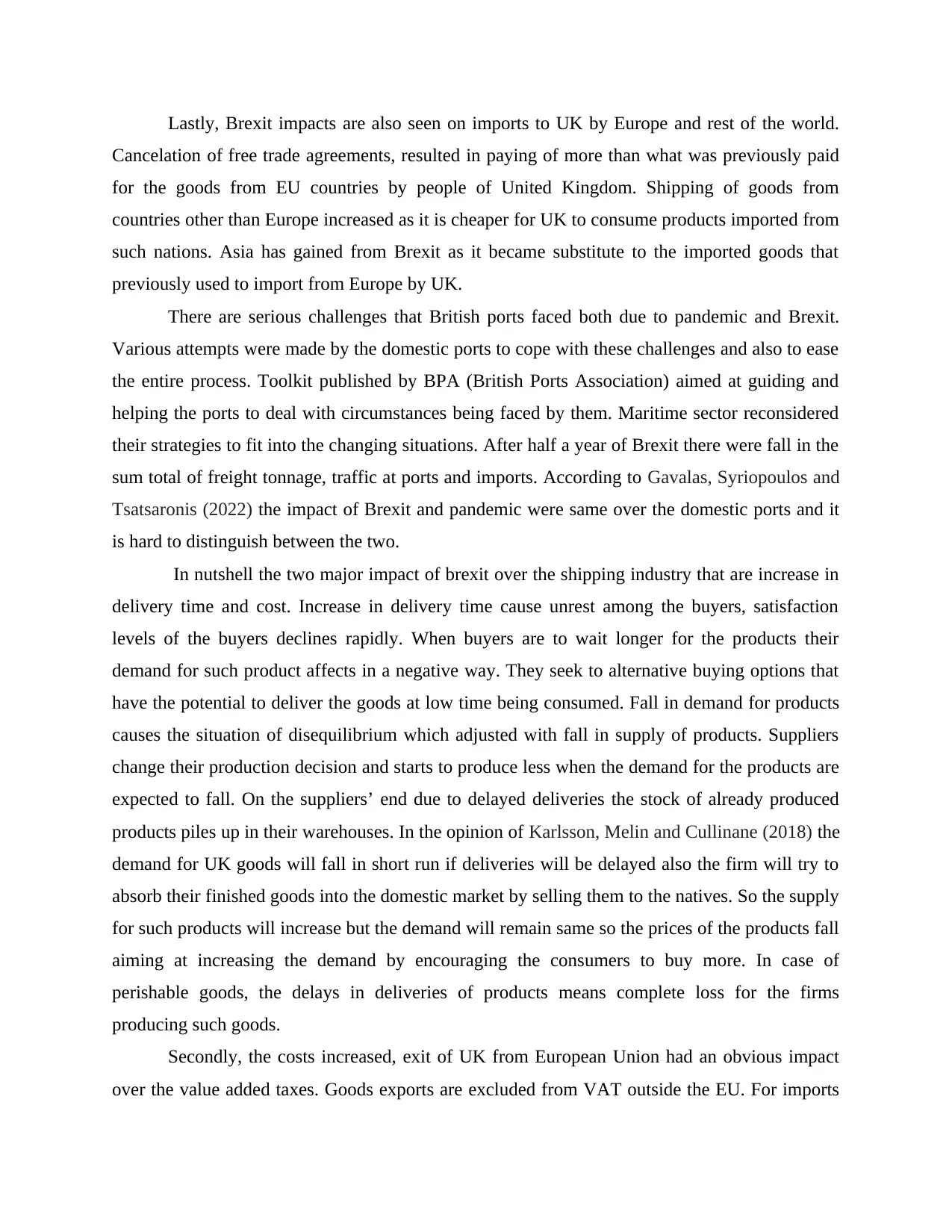
Lastly, Brexit impacts are also seen on imports to UK by Europe and rest of the world.
Cancelation of free trade agreements, resulted in paying of more than what was previously paid
for the goods from EU countries by people of United Kingdom. Shipping of goods from
countries other than Europe increased as it is cheaper for UK to consume products imported from
such nations. Asia has gained from Brexit as it became substitute to the imported goods that
previously used to import from Europe by UK.
There are serious challenges that British ports faced both due to pandemic and Brexit.
Various attempts were made by the domestic ports to cope with these challenges and also to ease
the entire process. Toolkit published by BPA (British Ports Association) aimed at guiding and
helping the ports to deal with circumstances being faced by them. Maritime sector reconsidered
their strategies to fit into the changing situations. After half a year of Brexit there were fall in the
sum total of freight tonnage, traffic at ports and imports. According to Gavalas, Syriopoulos and
Tsatsaronis (2022) the impact of Brexit and pandemic were same over the domestic ports and it
is hard to distinguish between the two.
In nutshell the two major impact of brexit over the shipping industry that are increase in
delivery time and cost. Increase in delivery time cause unrest among the buyers, satisfaction
levels of the buyers declines rapidly. When buyers are to wait longer for the products their
demand for such product affects in a negative way. They seek to alternative buying options that
have the potential to deliver the goods at low time being consumed. Fall in demand for products
causes the situation of disequilibrium which adjusted with fall in supply of products. Suppliers
change their production decision and starts to produce less when the demand for the products are
expected to fall. On the suppliers’ end due to delayed deliveries the stock of already produced
products piles up in their warehouses. In the opinion of Karlsson, Melin and Cullinane (2018) the
demand for UK goods will fall in short run if deliveries will be delayed also the firm will try to
absorb their finished goods into the domestic market by selling them to the natives. So the supply
for such products will increase but the demand will remain same so the prices of the products fall
aiming at increasing the demand by encouraging the consumers to buy more. In case of
perishable goods, the delays in deliveries of products means complete loss for the firms
producing such goods.
Secondly, the costs increased, exit of UK from European Union had an obvious impact
over the value added taxes. Goods exports are excluded from VAT outside the EU. For imports
Cancelation of free trade agreements, resulted in paying of more than what was previously paid
for the goods from EU countries by people of United Kingdom. Shipping of goods from
countries other than Europe increased as it is cheaper for UK to consume products imported from
such nations. Asia has gained from Brexit as it became substitute to the imported goods that
previously used to import from Europe by UK.
There are serious challenges that British ports faced both due to pandemic and Brexit.
Various attempts were made by the domestic ports to cope with these challenges and also to ease
the entire process. Toolkit published by BPA (British Ports Association) aimed at guiding and
helping the ports to deal with circumstances being faced by them. Maritime sector reconsidered
their strategies to fit into the changing situations. After half a year of Brexit there were fall in the
sum total of freight tonnage, traffic at ports and imports. According to Gavalas, Syriopoulos and
Tsatsaronis (2022) the impact of Brexit and pandemic were same over the domestic ports and it
is hard to distinguish between the two.
In nutshell the two major impact of brexit over the shipping industry that are increase in
delivery time and cost. Increase in delivery time cause unrest among the buyers, satisfaction
levels of the buyers declines rapidly. When buyers are to wait longer for the products their
demand for such product affects in a negative way. They seek to alternative buying options that
have the potential to deliver the goods at low time being consumed. Fall in demand for products
causes the situation of disequilibrium which adjusted with fall in supply of products. Suppliers
change their production decision and starts to produce less when the demand for the products are
expected to fall. On the suppliers’ end due to delayed deliveries the stock of already produced
products piles up in their warehouses. In the opinion of Karlsson, Melin and Cullinane (2018) the
demand for UK goods will fall in short run if deliveries will be delayed also the firm will try to
absorb their finished goods into the domestic market by selling them to the natives. So the supply
for such products will increase but the demand will remain same so the prices of the products fall
aiming at increasing the demand by encouraging the consumers to buy more. In case of
perishable goods, the delays in deliveries of products means complete loss for the firms
producing such goods.
Secondly, the costs increased, exit of UK from European Union had an obvious impact
over the value added taxes. Goods exports are excluded from VAT outside the EU. For imports
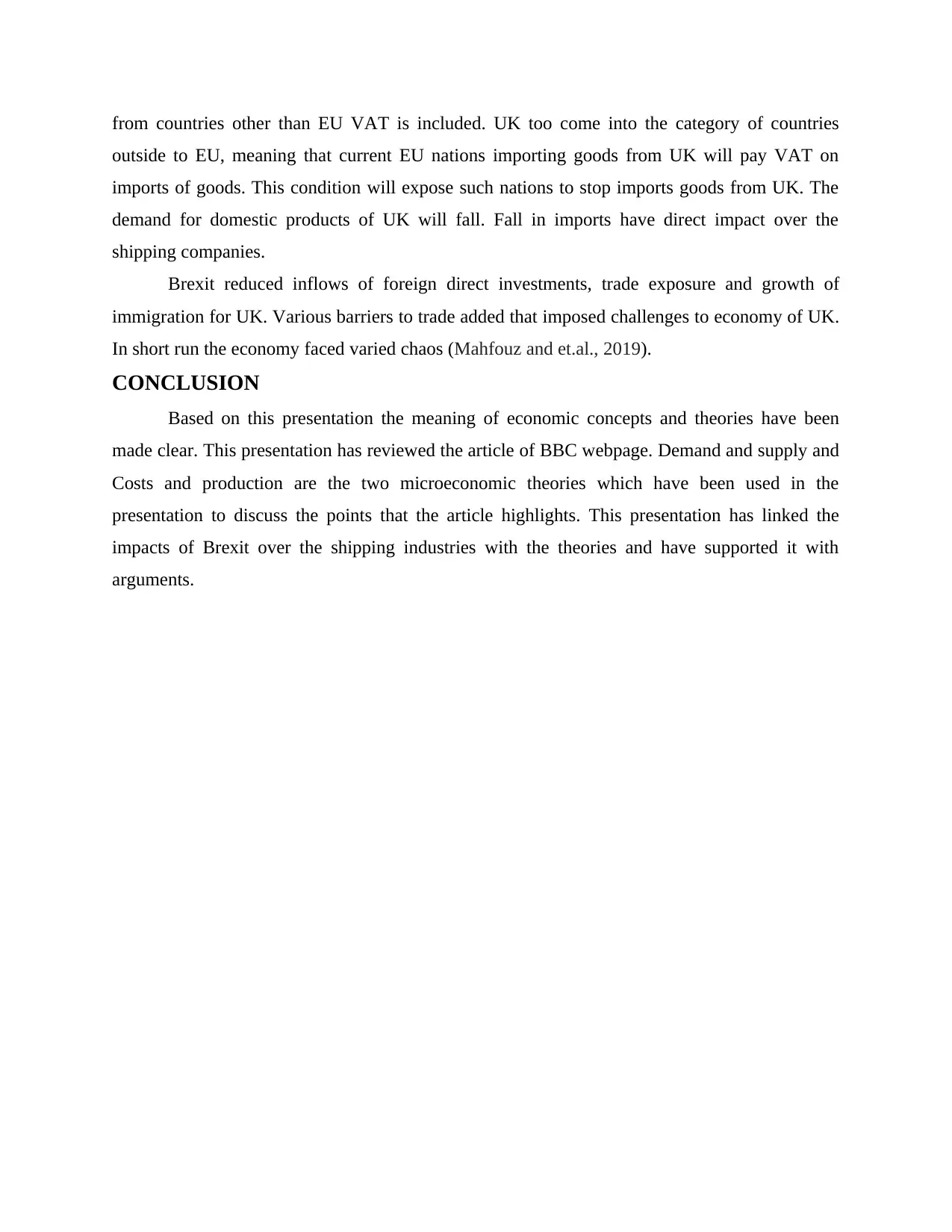
from countries other than EU VAT is included. UK too come into the category of countries
outside to EU, meaning that current EU nations importing goods from UK will pay VAT on
imports of goods. This condition will expose such nations to stop imports goods from UK. The
demand for domestic products of UK will fall. Fall in imports have direct impact over the
shipping companies.
Brexit reduced inflows of foreign direct investments, trade exposure and growth of
immigration for UK. Various barriers to trade added that imposed challenges to economy of UK.
In short run the economy faced varied chaos (Mahfouz and et.al., 2019).
CONCLUSION
Based on this presentation the meaning of economic concepts and theories have been
made clear. This presentation has reviewed the article of BBC webpage. Demand and supply and
Costs and production are the two microeconomic theories which have been used in the
presentation to discuss the points that the article highlights. This presentation has linked the
impacts of Brexit over the shipping industries with the theories and have supported it with
arguments.
outside to EU, meaning that current EU nations importing goods from UK will pay VAT on
imports of goods. This condition will expose such nations to stop imports goods from UK. The
demand for domestic products of UK will fall. Fall in imports have direct impact over the
shipping companies.
Brexit reduced inflows of foreign direct investments, trade exposure and growth of
immigration for UK. Various barriers to trade added that imposed challenges to economy of UK.
In short run the economy faced varied chaos (Mahfouz and et.al., 2019).
CONCLUSION
Based on this presentation the meaning of economic concepts and theories have been
made clear. This presentation has reviewed the article of BBC webpage. Demand and supply and
Costs and production are the two microeconomic theories which have been used in the
presentation to discuss the points that the article highlights. This presentation has linked the
impacts of Brexit over the shipping industries with the theories and have supported it with
arguments.
⊘ This is a preview!⊘
Do you want full access?
Subscribe today to unlock all pages.

Trusted by 1+ million students worldwide
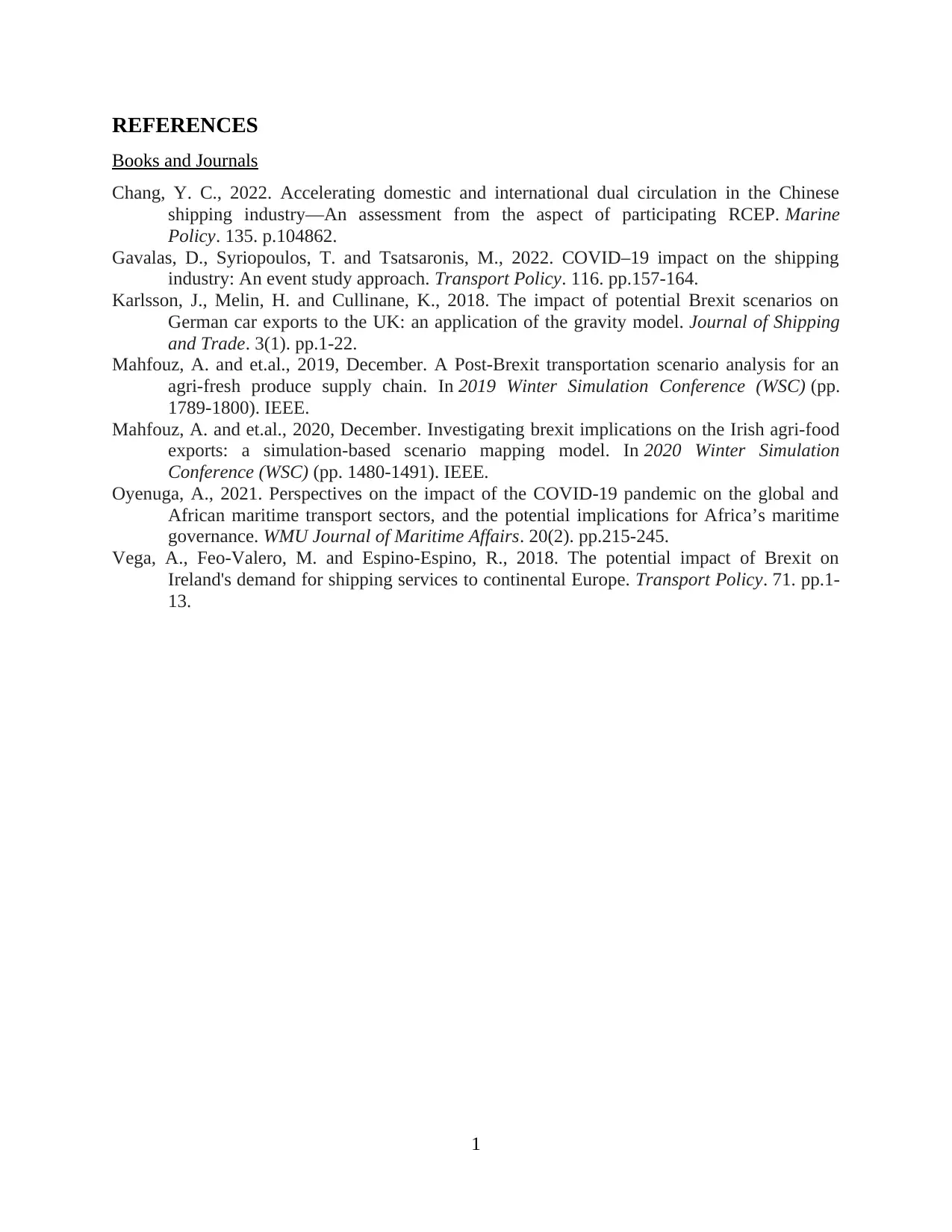
REFERENCES
Books and Journals
Chang, Y. C., 2022. Accelerating domestic and international dual circulation in the Chinese
shipping industry—An assessment from the aspect of participating RCEP. Marine
Policy. 135. p.104862.
Gavalas, D., Syriopoulos, T. and Tsatsaronis, M., 2022. COVID–19 impact on the shipping
industry: An event study approach. Transport Policy. 116. pp.157-164.
Karlsson, J., Melin, H. and Cullinane, K., 2018. The impact of potential Brexit scenarios on
German car exports to the UK: an application of the gravity model. Journal of Shipping
and Trade. 3(1). pp.1-22.
Mahfouz, A. and et.al., 2019, December. A Post-Brexit transportation scenario analysis for an
agri-fresh produce supply chain. In 2019 Winter Simulation Conference (WSC) (pp.
1789-1800). IEEE.
Mahfouz, A. and et.al., 2020, December. Investigating brexit implications on the Irish agri-food
exports: a simulation-based scenario mapping model. In 2020 Winter Simulation
Conference (WSC) (pp. 1480-1491). IEEE.
Oyenuga, A., 2021. Perspectives on the impact of the COVID-19 pandemic on the global and
African maritime transport sectors, and the potential implications for Africa’s maritime
governance. WMU Journal of Maritime Affairs. 20(2). pp.215-245.
Vega, A., Feo-Valero, M. and Espino-Espino, R., 2018. The potential impact of Brexit on
Ireland's demand for shipping services to continental Europe. Transport Policy. 71. pp.1-
13.
1
Books and Journals
Chang, Y. C., 2022. Accelerating domestic and international dual circulation in the Chinese
shipping industry—An assessment from the aspect of participating RCEP. Marine
Policy. 135. p.104862.
Gavalas, D., Syriopoulos, T. and Tsatsaronis, M., 2022. COVID–19 impact on the shipping
industry: An event study approach. Transport Policy. 116. pp.157-164.
Karlsson, J., Melin, H. and Cullinane, K., 2018. The impact of potential Brexit scenarios on
German car exports to the UK: an application of the gravity model. Journal of Shipping
and Trade. 3(1). pp.1-22.
Mahfouz, A. and et.al., 2019, December. A Post-Brexit transportation scenario analysis for an
agri-fresh produce supply chain. In 2019 Winter Simulation Conference (WSC) (pp.
1789-1800). IEEE.
Mahfouz, A. and et.al., 2020, December. Investigating brexit implications on the Irish agri-food
exports: a simulation-based scenario mapping model. In 2020 Winter Simulation
Conference (WSC) (pp. 1480-1491). IEEE.
Oyenuga, A., 2021. Perspectives on the impact of the COVID-19 pandemic on the global and
African maritime transport sectors, and the potential implications for Africa’s maritime
governance. WMU Journal of Maritime Affairs. 20(2). pp.215-245.
Vega, A., Feo-Valero, M. and Espino-Espino, R., 2018. The potential impact of Brexit on
Ireland's demand for shipping services to continental Europe. Transport Policy. 71. pp.1-
13.
1
1 out of 7
Related Documents
Your All-in-One AI-Powered Toolkit for Academic Success.
+13062052269
info@desklib.com
Available 24*7 on WhatsApp / Email
![[object Object]](/_next/static/media/star-bottom.7253800d.svg)
Unlock your academic potential
Copyright © 2020–2026 A2Z Services. All Rights Reserved. Developed and managed by ZUCOL.



